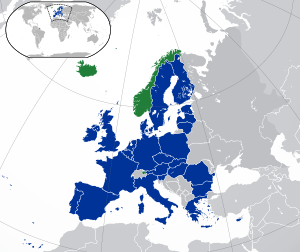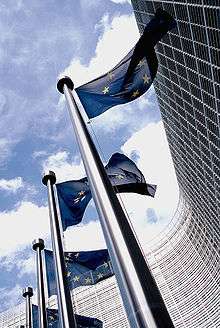Joint Research Centre
The Joint Research Centre (JRC) is the European Commission's science and knowledge service which employs scientists to carry out research in order to provide independent scientific advice and support to EU policy. The JRC is a Directorate-General of the European Commission under the responsibility of Tibor Navracsics, Commissioner for Education, Culture, Youth & Sport. The current Director General of the JRC is Stephen Quest, who took office on 01/05/2020, succeeding Vladimír Šucha.[1] Its Board of Governors assists and advises the Director-General on matters relating to the role and the scientific, technical and financial management of the JRC.
_(logo).jpg)
Composed of strategy and coordination, knowledge production, knowledge management and support directorates, the JRC is spread across six sites in five different countries within the EU: in Belgium (Brussels and Geel), Germany (Karlsruhe), Italy (Ispra), the Netherlands (Petten), and Spain (Seville).
History
The Italian Centre in Ispra originally belonged to the Comitato Nazionale per l'Energia Nucleare (CNEN) and was officially transferred to the Community on March 1, 1961.[2] Since 1973, non-nuclear research evolved rapidly, especially in topics related to safety and the environment. In 1992, the results of a study led to a proposal to convert the JRC Ispra site into an environmentally-optimised model site; the "ECO Centre". At the beginning of the 1980s, re-examination of the mandate and evaluation of the activities of the JRC began. Future activities were to continue to support the Commission's implementations of Community policies. After 16 years of research, the nuclear reactor at JRC Ispra[3] was shut down in 1983.[4] The JRC employs around 2787 staff with an annual budget of 372,5 million euros for the year 2017.[5]
Science areas
The JRC research activities are clustered into ten science areas:[6]
- Agriculture and food security
- Economic and Monetary Union
- Energy and transport
- Environment and climate change
- Health and consumer protection
- Information Society
- Innovation and growth
- Nuclear safety and security
- Safety and Security
- Standards
See also
- Best Available Techniques Reference Document (BREF)
- Directorate-General
- Directorate-General for Research
- Directorate-General for Information Society and Media (European Commission)
- European Research Area (ERA)
- European Research Council (ERC)
- European Institute of Technology (EIT)
- European Research Advisory Board (EURAB)
- European School
- Framework Programmes for Research and Technological Development
- Joint Technology Initiative
- Lisbon Strategy
- Seventh Framework Programme
- Scientific Advice Mechanism
- Sixth Framework Programme
References
- Organisation - Joint Research Centre. Retrieved on 2020-05-13
- History of the Joint Research Centre, Ispra Site. YouTube (2009-12-21). Retrieved on 2013-09-05.
- Essai Orgel (ESSOR), 1969. YouTube (2012-07-30). Retrieved on 2013-09-05.
- http://ec.europa.eu/dgs/jrc/downloads/jrc_ispra_50_years_history_en.pdf
- "JRC Annual Report 2017 - European Commission". ec.europa.eu. Retrieved 26 October 2018.
- https://ec.europa.eu/jrc/en/science-areas




